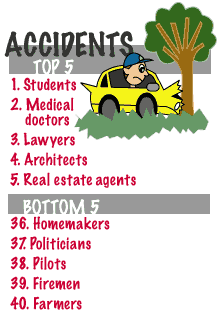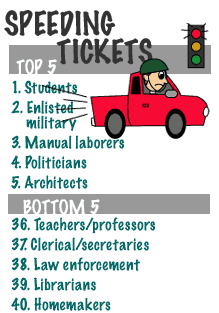NEW YORK (CNN/Money) - It shouldn't surprise you that students get in more car wrecks than those in any other occupation. They're inexperienced and lack a healthy dose of fear. Lucky for them that a doctor is likely to be at the scene. Medical doctors rank second in accident rates.
According to data from Quality Planning Corporation, a San Francisco-based company that helps insurance companies rate driver risk, attorneys, architects and real estate agents round out the top five most crash-prone occupations.

"The numbers blow big holes in the conventional wisdom about which professions are accident prone or dangerous drivers," said Daniel Finnegan, president of QPC.
The QPC survey ranked 40 different occupations. The company looked at data collected by insurance companies on 1 million drivers. The data cover an 18-month period ending one year ago.
Fifteen percent of students listed in the data were involved in an accident. The figure for doctors was 11 percent. Just four percent of farmers, on the other hand were involved in an accident.
Long hours, especially for doctors in the training phase of their careers, may contribute to the higher accident rate for physicians, said a spokesperson for the American Medical Association. The AMA has not studied physician involvement in auto accidents.

"Fatigue could be a factor," offered the AMA spokesperson. Medical residents and fellows often put in eighty-hour work weeks.
Lots of cell phone use, a common factor among doctors, lawyers and real estate agents, may also contribute, said the spokesperson. "There's plenty of evidence that shows that cell phone use is a big contributor to accidents," he said
The company also looked at which occupations are most prone to speeding tickets. Again, students, nine percent of whom got a speeding ticket, top the list. Virtually tied for second place enlisted military personnel, manual laborers and politicians, all of whom got speeding tickets at a rate of about eight percent. Seven percent of architects got speeding tickets. Architects and students were the only professions to make the top five in both lists.
Politicians managed the unlikely feat of ranking in the top five in speeding violations while at the same time ranking in the bottom five in accidents. Only homemakers ranked in the bottom five in both accidents and speeding tickets.
Insurance companies do not generally base the premiums they charge on occupation, said Finnegan, because it's often difficult verify. Also, insurance companies have to provide justification for premiums to state regulators, he said, and that would require more data.
"In the end we're very, very bad at predicting who is going to have an accident," said Finnegan, "I can't predict, for any individual person, who's going to have an accident within the next year."
"Except for students," added Robert U'Ren, QPC's vice president for business development and underwriting. "They're a bad risk."

|

